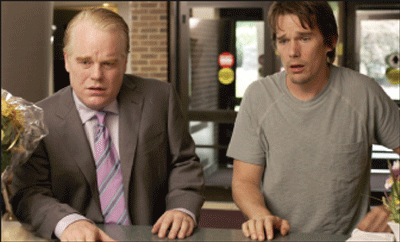By Steven Snyder
There’s a sense of before-and-after that’s alluded to in the title of Sidney Lumet’s latest thriller, “Before the Devil Knows You’re Dead.” It refers to the second half of an Irish toast, which begins with a wish that you get to enjoy heaven for a small while before the devil discovers you’re dead. Hopefully the mistake in accounting allows you to escape hell for a few precious moments, but the inevitable is still looming.
So it seems appropriate that Lumet’s tale is wrapped in an aura of inescapable dread, a feeling that increases the more we jump around in time. Lumet starts things in the present, and then floats both into the future and the past, and the more we see of the prologue and the epilogue, the more we appreciate that these characters’ destinies have been etched in stone. Namely, two, foolish men who were fated to make their mistake and then enjoy what they have for a few minutes before it goes up in flames.
With a visual style and story structure clearly inspired by Stanley Kubrick’s “The Killing,” a 1956 time-tripping thriller about a racetrack robbery, and Quentin Tarantino’s “Pulp Fiction,” which zigzags wildly through time and between the lives of a boxing veteran who throws a match and the mafia hitmen dispatched to collect on a debt, Lumet — the 83-year-old director long known for his love of New York locales — plays fast and loose with the clock, and the motivations of his characters, caught up in the drama of a jewelry heist.
We begin the maze on the day of the robbery, in the parking lot of a Westchester strip mall, a masked gunman striding in to a mom and pop gem boutique, three gun shots making the carefully-planned caper go very, very wrong. Panicking out in the getaway car is Hank (Ethan Hawke), a struggling divorcee who can find enough money his wallet for the nightly routine of beer and shots, but who can’t put together enough funds to make his child support payments to his ex. Racing away from the scene of the crime, he calls Andy (Philip Seymour Hoffman), his brother, an executive at work in some sort of high-rise Manhattan office, put in charge of a payroll system which he steals from stealthily to support his escalating drug habit, and to pay for the lifestyle that his freewheeling wife (Marisa Tomei) demands.
They are both strapped for cash, one desperately needing funds to stay afloat and the other needing dollar bills to continue the luxury cruise, and it’s Andy who hatches the plan one day — a “harmless,” “victimless” plan that will solve all their problems. Yet there is something so awful and insidious about the proposal that Andy makes to his brother — intent on robbing mom and dad’s jewelry store on Saturday morning, when they won’t be there, already aware of where the store’s money is hidden and the fact that their parent’s insurance policy will cover the losses — that the disastrous aftermath almost seems to be some sort of supernatural payback for an unholy partnership.
After the robbery goes wrong, we learn more about the relationship both Andy and Hank have with their parents and the way that this robbery does not just satisfy a need for money, for also some need for one brother’s vengeance, steeped further back in an ocean of painful childhood memories. And yet still, we plow further into the future, as one brother must protect another from the crime’s repercussions, and how the generational conflicts that began decades ago come back to the surface.
It’s a complicated tapestry, which peels away one layer after another, merging from robbery thriller to survival tale to the darkest sort of family thriller, each jump in time upping the stakes and amplifying the tension. It’s the best sort of pop entertainment, one that builds emotional resonance into the simple thrills. That’s why “Before the Devil Knows You’re Dead” emerges as one the year’s most intriguing films — for Andy and Hank, it’s not just “damned if you do and damned if you don’t.” They already did, and they were always going to, and know there is simply no way to escape the damnation. They know what’s coming to them, and the movie is less about their potential escape then about how they embrace their doomed destiny — and why for at least one of them, it was worth it.























